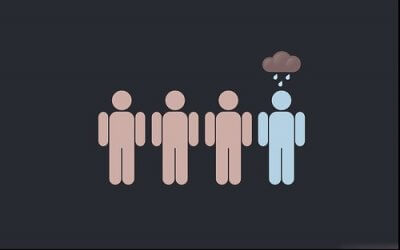“Why do I Always Have Bad Luck”? (Sometimes It Might Be You)

BBy: Bede Jackson
By Andrea M. Darcy
Always have bad luck compared to everyone around you? Feel like you were born under a bad star? And spend your life telling everyone who will listen one unbelievable story after another?
Why is it you are always the unlucky one? You might have more control over this than you think.
Bad things, good people?
Yes, sometimes life throws curve balls. Tough ones. People do get into accidents, or get sick, or are victims of crime or childhood trauma. We lose loved ones, lose jobs.
Life is not easy or perfect. But difficulties help us learn and grow. We develop resiliency and gain clarity on what we value.
But if your luck is sour almost daily, or at the very least weekly? And there is a pattern to it? If it’s always, say, you that people let down, or you that gets lied to, or who constantly ends up with partners who aren’t what they seem?
It might be that you are the driving force behind many of your difficult experiences, not just life being life.
How are you creating your own bad luck?
How is it possible you are choosing bad things? Let’s look at how it works.
1. You don’t believe you deserve good things.

photo by Philipp Meiners
Our conscious thoughts are rarely what really drives the show. Sure, they get us from A to B. But it’s unconscious thinking that has the upper hand.
Our unconscious hides a belief system we’ve been developing since childhood. We tend to make decisions to prove the strongest of these beliefs, called ‘core beliefs’, as true.
If you grew up with support and unconditional love, you core belief might be, “I deserve good things.” You probably veer towards nice things naturally.
If, on the other hand, you didn’t get that unconditional acceptance and love? Or you experienced things like neglect or trauma? You might have what’s called ‘limiting beliefs’. These can look like:
- I am not worthy
- there is something wrong with me
- I am unloveable
- I am flawed
- Only bad things happen to me
- I deserve bad things.
2. So you make one bad decision after another.
Core beliefs can ‘blind’ us to opportunities, as we unconsciously choose the wrong things again and again or make life difficult, then we call it ‘bad luck’.
You will take a job you don’t really like, telling yourself ‘it will be fine’, only to be terribly unhappy and say “I had no idea it would be so boring, it’s just bad luck’. But you knew in the interview it sounded boring.
You’ll meet someone who makes you nervous but keep dating them. And later claim ‘they seemed so nice but who knew they were horrible or a narcissist or something, I am so unlucky’. And yet… on that very first date, if you are honest with yourself, you were uncomfortable with them. But ignored it.
Don’t believe your unconscious mind is really that powerful? Experimental psychologist Richard Wiseman spent ten years studying “the Luck Factor”. In one experiment, he gave people a newspaper, asking them to count the photos inside.
Those who felt they were lucky types were done in seconds, spotting a clear message two inches high on the second page of the paper, “Stop counting – There are 43 photographs in this newspaper.”
Those who felt they were unlucky? Missed the message and kept counting. And it gets worse. There was also a second large message half way through the newspaper that read, “Stop counting, tell the experimenter you have seen this and win $250.” Their minds tended to overlook both messages.
3. You are addicted to suffering and uncomfortable with joy.

photo by: Ahmad Gunnaivi
Here’s the funny thing about pain and misery. It’s terribly addictive.
If we grew up in a household that was unstable, with a miserable parent or parents, or where we were constantly put through emotional or physical pain? Misery can actually be our comfort zone.
We secretly are suspicious of happiness or good luck. So again, we unconsciously veer towards the opposite, like messy relationships and hard situations.
4. You are doing the same things again and again.
You are always going on about how unlucky you are. It’s even the little things.
Every time you go to the grocery store, for example, you miss the markdowns you friend always get. (But you keep losing track of time and going late). Even the homeless man on the street yells at you (but you keep giving him dirty looks). And you can’t explain why you are so unlucky with money. Every month it runs out (but you’ve still never sat down and made a budget despite three friends telling you to).
You see how it works? We blame it on luck, when really we are stubbornly sticking to our rut and we don’t actually want to change.
Because here’s the clincher — change requires hard work. And commitment. And discomfort. Learning new things, making mistakes. Blaming it on bad luck is easier.
5. You surround yourself with people who increase your misery.

By: Bill Ward
There is a joke going around that ‘you aren’t depressed, you are just hanging around idiots’. In one way it’s not a very funny joke. Depression is a very real debilitating illness. If you are a sufferer, it can strike out of the blue and very little can seem to budge it.
On the other hand, there is something true about how influenced we are by those we surround ourselves by. Misery is rather contagious.
Healthy connection, on the other hand — where we feel relaxed and able to be totally ourselves, and accepted for that — not only lowers depression but is shown by research to increase our health and longevity.
6. You have formed your identity around being a victim.
This can be a tough one to admit to. After all, you did experience a trauma. You are a victim. You deserve everyone’s sympathy!
But when did the trauma happen? What have you actively done to take care of yourself and heal from it ever since? Have you worked to heal? Or did you, somewhere along the line, get a bit too used to the sympathy talking about it gets you? And start to create your whole identity around the victim mentality? Constantly choosing new mini traumas to maintain your pipeline to other’s sympathy?
Feel that this idea is simply unfair? That your trauma is worse than everyone else’s? Viktor Frankl was a psychotherapist who suffered through the worst atrocities humankind has seen, that of a concentration camp. He survived and wrote a famous book, “Man’s Search For Meaning“, in which he wrote:
“We who lived in concentration camps can remember the men who walked through the huts comforting others, giving away their last piece of bread. They may have been few in number, but they offer sufficient proof that everything can be taken from a man but one thing: the last of the human freedoms — to choose one’s attitude in any given set of circumstances, to choose one’s own way.”
7. You haven’t spent time seeking meaning and purpose.
We aren’t all necessarily here to have one big clear life purpose we go after. But we are all absolutely capable of taking the time to weave purpose and meaning into all areas of our life.
Frankl attributed the fact that he got through life in a concentration camp without the broken spirit seen in other survivors to refusing to give up seeking meaning. ““In some ways suffering ceases to be suffering at the moment it finds a meaning, such as the meaning of a sacrifice,” he wrote.
But I can’t just choose to be lucky
Back to that ten year study on luck. It proved that actually, you can indeed choose to be lucky.
The research concluded that ‘lucky people’ actually generated their good fortune because of four basic principals:
- creating and noticing chance opportunities
- listening to their intuition
- creating self-fulfilling prophesies via positive expectations
- adopt a resilient attitude that transforms bad luck into good.
Yes, pain, victimhood, unhealthy relationships, and misery are addictive. They can be a comfort zone. It can take real effort to move on, to learn positive ways of seeing and being, and can often involve a commitment to therapy or coaching. But to again quote Viktor Frankl:
“Forces beyond your control can take away everything you possess except one thing, your freedom to choose how you will respond to the situation.”
Are you sick of your ‘bad luck’ and ready to turn it around? We link you to a team of highly regarded London-based therapists. Or use our booking platform to source UK-wide therapists and online counselling.
 Andrea M. Darcy is a the lead writer of this site. With some training in person-centred therapy and coaching, she has penned thousands of mental health articles. Find her on Twitter and Linkedin.
Andrea M. Darcy is a the lead writer of this site. With some training in person-centred therapy and coaching, she has penned thousands of mental health articles. Find her on Twitter and Linkedin.





Thank you this article really make a lot of sense I’m going to write most of what was written in this article down and read it every day and try to practice somethings .I’m 38 and been struggling my whole life with depression and many other things such as growing up in poverty and hanging with bad people , I aways think I have bad luck I’ve have always used drugs and alcohol because of my life which only makes things worse the sad thing is I don’t even like the drugs but I am so far gone and it all I know I know I’m a good person and want good thing I think this will help me thank you.
Hi Michael, thanks for taking the time to comment. We fully believe nobody is ‘too far gone’. And that you are indeed a good person. Most people are, given half a chance. We are generally more powerful and resourceful than we realise. It’s just that, without realising it, we have mistaken a set of assumptions as ‘fact’ and they are running around in our unconscious, controlling the show. Thoughts like, ‘I am not good enough’, ‘there is something wrong with me’, ‘bad things happen to people like me’. When we start to realise these unconscious thoughts are just assumptions and not facts, we can start to bit by bit make different choices. We can stop hanging around those people and start seeking more positive influences. And we can choose to believe we deserve help and support. That’s a big one. When we finally accept we deserve that and reach out for some support, whether that is a 12 step group, or some counselling, things can really start to shift. And we really believe you don’t like the drugs. A lot of people with destructive habits don’t like the habit. It’s just, again, that they have convinced themselves they don’t deserve better. They do. We all do. You don’t have to be special to deserve more, or different. You deserve more just as you are. An easy first step here can be to try to imagine that you are actually your own friend. Start to notice all the things you think about yourself and say to yourself and about yourself. Would you say those things to a friend? then why are you saying them to yourself? What would you do for yourself if you were another person who was a good friend? This is called ‘self compassion’. it’s powerful stuff. If it helps, write a letter to another person you know, a friend, giving them support over their struggles. Then read that letter back but make the name at the top yours. That’s how we need to talk to ourselves. By the way, if you need to find some support, we have an article here full of ideas on how to find free or low cost counselling http://bit.ly/lowcosttherapy. We wish you courage. best, HT.
Especially for many of us single guys that can’t even find love at all. even when we really try. Go figure.
I’ve grown up as an overweight kid. Since childhood, my relatives compared me with my siblings and said things like: ‘You are not fair enough’, ‘You are not pretty’, ‘You are too fat’. I am born to a family which is filled with good looking people, even my parents fall into the ‘Good looking’ category. So literally I was considered as ‘unlucky’, ‘the ugly ducking’ or ‘black sheep’. They always used to make fun out of me or bully me. That’s the environment I grew up in. I always had social anxiety. Whenever I step out, those words still torment me. I always lacked self confidence. I always wanted to hide myself from people. Even my mom used to say that I was not pretty, and that was the worst to hear as a kid. Not only that, I never had healthy relationships. I thought to myself that: ‘I’m unlucky in love’. I never worked hard either coz I thought I was not important. Everything happened in my life, made me a very sad dull pessimistic person, thinking that I’m not lucky or good enough. Either way I tried my best to be kind to everyone no matter what they told me or did to me. A traumatic past is something which is very difficult to forget. I just want to build up my life to be the best version of myself. I just want to be happy, positive and feel worthy. I wish someone could help me along the way.
Thank you
Okay…….How do you explain why life is so good to some people? I know a woman who has gotten amazing jobs that just fell into her lap ( she didn’t even have to go through an interview process), Now she is very good at what she does. However, if there had been a competition, she may not have been screened in because this job would have drawn people with stronger credentials.
She is also, someone that’s always winning money. She once won $50,000 Now you could argue that she wins a lot because she gambles a lot. But how can you say there isn’t an element of good luck involve
Bad luck and unlucky with everything, shot tampered
I agree with Derek, some people seem to attract good luck and others back luck. I for one have had alot of bad luck . Since i was an adolescent , bad luck has always followed me.
I am a hard worker who never gives up but somehow , i have never succeeded in life . Its like there is a limit to what i can do , there is a ceiling to what i can achive.
I dont know what to do anymore as i am getting old .
Man this really hit home. I Always have had bad crap happen and I think it’s because I’m so understanding. I’m going to list stuff that’s happened just since April of 2023.
~Girlfriend of 12 Years left me and my dog
~Denied disability for 5th time.
~Lawyer dropped me
~My car started knocking so my parents were able to
help me get another vehicle. Turned out to be a
lemon.
~Let a friend move in and it went horribly bad due to him (just being honest, when I’m at fault for something I step up and claim it)
~ Parents helped me get another vehicle and THAT one broke down after three weeks.
~ Called about extended warrenty and they had weird phone issues
~ My dog went blind and diabetic
I got a new to me vehicle in 2011, 2016 2023 and 2023. Every single one have had issues right after I bought. And we did our due dillagent on them. Checked carfax, test drove, all of em was fine until I got em.
Peeps who know me it’s a thing… “stay away from Eric or his luck will rub off on you”
I was diagnosed with MDD, GAD & PTSD from my psychologist. We’ve tried 8 different depression/Anxiaty meds and they ALL make me really mean. None of them work for me.
I cant stand longer than 15ish minutes due to my Neuropathy and lower back issues. But disability says I can work. And once they decide that, you have to have NEW information before you can apply again. The judge who denied me last said since I waited 5 months in 2023 to get mental help, it must not be as bad as I say. Let alone my current psychologist is the one who diagnosed me. She was PISSED. Judge also said I didn’t do the things to help my back that the doctors said to do. But I did!! That tells me the lawyer didn’t do a good job. But then they dropped me.
Ibe been to the employment agencies around here and they can’t help me. They don’t look for specific jobs… A sit down job. I don’t know what to do work worse. I live in a house my parents own. They can’t help me. They have their own stuff.
There was a time when I was and felt very attractive then as time went by towards my mid 30s lost self confidence and even tried to commit suicide multiple times of which in one occasion was almost successful had it not been my girlfriend.I feel soo unwanted like there is a dark cloud just hanging there making sure it’s all misfortunes for me.Other thing I don’t believe in anything (religion) can’t pray to console myself with and the pain is getting unbearable,as I write I’m short of words got a lot in my chest but as always I struggle to let out all of what’s really bothering me but the misfortunes are getting out of hand and I wonder if I’ll ever be fine
I have been a victim of abuse since I was at least 8 years old I’ve been raped by my own family I’ve been abused by my family not to mention abused by my mother no one in my family taught me anything everything I know today I learned on my own half of my family isn’t even educated I had to educate myself and still not educated enough to say I can make it through life all I know is I have been suffering through anxiety depression through my whole years I am 40 now and I’m still hurt with a lot of pain I have not been healed since all of my trauma
Im a 17 year old dealing with depresión and anxiety at the moment I feel so lonely and I’m scared to call out for help because Im embarrassed. Most of my family have always called me the quite one or the one that stays away from people and I’m sure that’s because of my anxiety I fear everyday that something bad will happen or that I simply just have bad luck I read a saying “be expected for bad things so when it happens you won’t be disappointed” and I’ve really set that to my mind set. I’ve been really trying to fight all this but bad things keep popping up and it’s just getting worse and worse
I pray for everybody suffering from depression and bad luck, I pray GOD heals us and give us the grace to encounter goodlucks throughout our stay on earth.
AMEN!!!
Thank you for your article, It would be very helpful if you can put some points across on how to address it .. or just give a color on what to expect on this type of therapy.. as you know most of the people dont seek mental health help as it is not “normal” .. but I would say we should just evaluate it with a tangible measurements before it is too late and becomes a habit as you mentioned in one of the points.
I am overall tired with life. I give so much everyday all what I asking for a leg up. Tired of falling down everyday, climbing up and making things work. I dont have any energy to pray or cry. I am tired of living with bad luck all my life.
This article is very interesting. I could never say I was or appear to be a victim. If I share rarely a “bad luck” luck experience I laugh about it in presence of others. Am no different to others in that we help people when we can only because we want to (i.e don’t think I’m particularly bad person). However do see that I’m no doubt self limiting and expect no good. Just feel frustrated at times that things occur so frequently. From one week to the next and admit I’ve lost all motivation. Agree completely that life long issues contribute greatly (unlovable, unworthy etc.). Have tried CBT because of coinciding mental health but was “discharged” after approximately 1 month when I exhibited onset of “episode.” Other counselling has failed due to my inabilities also. I think a lot of us become resigned. Though I’ve been prescribed psychiatric medication most of life no one in mine (outside of professional sphere) would acknowledge or converse with me about that. Yes, what I’d expect🤣🤣
It’s is well…. Am just depressed,